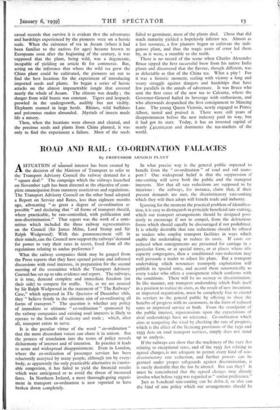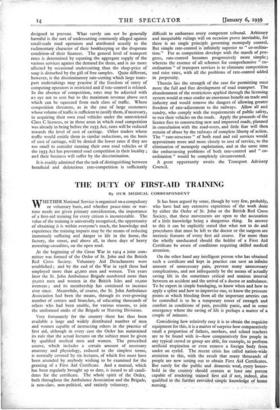ROAD AND RAIL : CO-ORDINATION FALLACIES
By PROFESSOR ARNOLD PLANT
ASITUATION of unusual interest has been created by the decision of the Minister of Transport to refer to the Transport Advisory Council the railway demand for a " square deal." The campaign which the railways launched on November 24th has been directed at the objective of com- plete emancipation from statutory restrictions and regulations. The Transport Advisory Council on the other hand adopted a Report on Service and Rates, less than eighteen months ago, advocating " as great a degree of co-ordination as possible " and declaring that " all forms of transport should, where practicable, be rate-controlled, with publication and non-discrimination." That report was the work of a com- mittee which included the three railway representatives on the Council (Sir James Milne, Lord Stamp and Sir Ralph Wedgwood). With this pronouncement still in their minds, can the Council now support the railways' demand for power to vary their rates in secret, freed from all the regulations relating to undue preference ?
What the railway companies think may be gauged from the Press reports that they have opened private and informal discussions with road interests, in preparation for the second meeting of the committee which the Transport Advisory Council has set up to take evidence and report. The railways, it is true, demand complete and immediate freedom (on their side) to compete for traffic. Yet, as we are assured by Sir Ralph Wedgwood in the statement of " The Railways' Case," which appeared in The Spectator of December 16th, they " believe firmly in the ultimate aim of co-ordinating all forms of transport." The question is whether any policy of immediate or ultimate " co-ordination " sponsored by the railway companies and existing road interests is likely to operate to the benefit of industry and trade ; which, after all, transport exists to serve.
It is the peculiar virtue of the word " co-ordination " that the most discordant voices can chant it in unison. But the process of translation into the terms of policy reveals disharmony of interest and of intention. In practice it leads to acute and widespread disappointment. Even in London, where the co-ordination of passenger services has been reluctantly accepted by many people, although not by every- body, as apparently the only practicable alternative to intoler- able congestion, it has failed to yield the financial results which were anticipated or to avoid the threat of increased fares. In Northern Ireland, a most thorough-going experi- ment in transport co-ordination is now reported to have broken down completely. In what precise way is the general public expected to benefit from the " co-ordination " of road and rail trans- port ? One widespread belief is that the suppression of rate-cutting will serve both the public and the transport interests. Not that all rate reductions are supposed to be injurious : the railways, for instance, claim that, if their present demands are met, the discriminatory rate-cutting which they will then adopt will benefit trade and industry.
Ignoring for the moment the practical problem of identifica- tion, it is easy to distinguish in principle beneficial rate-cutting, which our transport arrangements should be designed posi- tively to encourage if not to compel, from the deleterious forms which should equally be discouraged if not prohibited. It is wholly desirable that rate reductions should be offered to traders who employ transport facilities in ways which enable the undertaking to reduce its costs. If costs arc reduced when consignments are presented for carriage in a particular form, or at special times, or at places where idle capacity congregates, then a conditioned rate-reduction may well persuade a trader to adjust his plans. But a transport undertaking which renounces monopoly exploitation will publish its special rates, and accord them automatically to every trader who offers a consignment which conforms with the conditions. There will be no secrecy or discrimination. In like manner, any transport undertaking which finds itself in a position to reduce its costs, as the result of new inventions or improved organisation, must be completely free to extend its services to the general public by offering to share the benefits of progress with its customers, in the form of reduced rates or improved service or both. From the standpoint of the public interest, repercussions upon the expectations of rival undertakings have no relevance. Co-ordination which aims at tempering the wind by checking the rate of progress, which is the effect of the licensing provisions of the 1930 and 1933 Acts on road transport services, simply does not stand up to analysis.
If the railways can show that the machinery of the 1921 Act relating to exceptional rates, and of the 1933 Act relating to agreed charges, is not adequate to permit every kind of non- discriminatory rate reduction, and further powers can be granted under proper safeguards against discrimination, it is surely desirable that the law be altered. But can they ? It must be remembered that the agreed charges may already involve what before 1933 was regarded as " undue preference."
Just as beneficial rate-cutting can be defined, so also can the kind of rate policy which our arrangements should be designed to prevent. What surely can not be- gene harmful is the sort of undercutting commonly alleged against small-scale road operators and attributed usually to the rudimentary character of their bookkeeping or the desperate condition• of their finances. The general level of transport rates is determined by equating the aggregate supply of the various services against the demand for them, and is no more affected by occasional undercutting than the shop-price of soap is disturbed by the gift of free samples. Quite different, however, is the discriminatory rate-cutting which large trans- port undertakings may practise if the freedom of entry of competing operators is restricted and if rate-control is relaxed. In the absence of competition, rates may be adjusted with an eye not to cost but to the maximum revenue above cost which can be squeezed from each class of traffic. Where competition threatens, as in the case of large customers whose volume of traffic is sufficient to justify them, if necessary, in acquiring their own road vehicles under the unrestricted Class C licences, or in those areas in which road competition was already in being before the 1933 Act, rates will be reduced towards the level of cost of carriage. Other traders whose traffic would entitle them to similar reductions, on the basis of cost of carriage, will be denied the lower rates if they are too small to consider running their own road vehicles or if the 1933 Act has prevented road competition in their locality ; and their business will suffer by the discrimination.
It is readily admitted that the task of distinguishing between beneficial and deleterious rate-competition is sufficiently difficult to embarrass every competent tribunal. Arbitrary and inequitable rulings will on occasion prove inevitable, for there is no single principle governing monopoly control. But simple rate-control is infinitely superior to " co-ordina- tion." For as competition develops with the march of pro- gress, rate-control becomes progressively more simple:; whereas the essence of all schemes for comprehensive " co- ordination " of transport services is to eliminate competition and raise rates, with all the problems of rate-control added in perpetuity.
Therein lies the strength of the case for permitting once more the full and free development of road transport. The abandonment of the restrictions applied through the licensing system would at once confer an enormous benefit on trade and industry and would remove the dangers of allowing greater freedom of rate-adjustment to the railways. Allow all and sundry, who comply with the requirements of public safety, to run their vehicles on the roads. Apply the proceeds of the licence fees to constructing new and improved roads, planned in consultation with the road-users, and little fear will then remain of abuse by the railways of complete liberty of action. The " rate-structure " of both road and rail services would approximate more and more closely to cost of service, to the elimination of monopoly exploitation, and at the same time the embarrassing problems of both rate-control and " co- ordination " would be completely circumvented.
A great opportunity awaits the Transport Advisory Council.











































 Previous page
Previous page